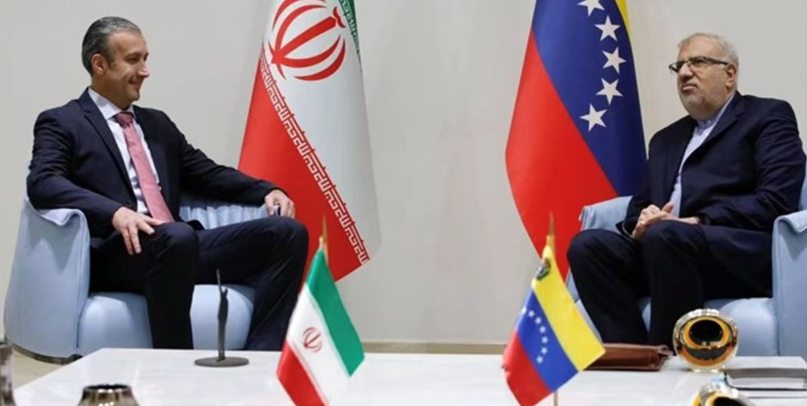Iran cultivates influence in Venezuela on an anti-American and anti-Israel ideological platform and exploits Venezuela’s political and economic vulnerabilities, namely a deeply corrupt leadership that creates repeated legitimacy crises. Iran also curries Venezuela’s favor by supporting it on the international stage against U.S. pressure to reform. The corruption further allows organized crime and narcotics trafficking to thrive, which has provided Iran and its proxy Hezbollah additional avenues of influence. Corruption and mismanagement have driven Venezuela’s oil infrastructure into a dilapidated state, which has given Iran the opportunity to engage in oil diplomacy.
The first vulnerability that Iran exploits is the Venezuelan’s leadership’s left-wing ideology, which shares a core feature with the belief system imposed by Iran’s ruling clerics. Both condemn and promote hostility towards the U.S. and blame it for domestic challenges. Venezuela also has been highly critical of Israel. Hugo Chávez, in particular, was known for his outspoken criticism of Israel and his support for the Palestinians. While Palestinian terrorist groups have threatened and attacked Israel, Chávez has sought to help their cause on the international stage. Anti-American and anti-Israeli sentiment in Venezuela has created openings for Iranian cultural engagement and diplomacy.
The second vulnerability is the prevalence of corruption among Venezuela’s political elite. This feature of Venezuela and Iran’s political systems has contributed to popular discontent in both countries. In Venezuela, it culminated in a political legitimacy crisis, which came to a head in 2019 with the Venezuelan presidential crisis. The U.S. government-supported opposition leader, Juan Guaidó, claimed power and attempted to set up a parallel government, challenging the legitimacy of Maduro’s administration. Although the crisis has since subsided, the Venezuelan regime’s diminishing popular legitimacy remains a vulnerability. It forces Venezuela to rely on other authoritarian regimes such as Iran, which similarly lack popular domestic support. In fact, international support and economic ties help both Iran and Venezuela sustain their control despite domestic opposition. Venezuela and Iran have formed a political alliance and strive to attract other states into it, particularly authoritarian regimes dissatisfied with U.S. global leadership.
Thirdly, organized crime driven by top political officials like Venezuela’s former Oil Minister, Tareck El Aissami, attracts Iran and its terrorist proxy Hezbollah. El Aissami, sanctioned by the U.S. Department of the Treasury in 2017 for aiding the drug trade, and then indicted by the U.S. Department of Justice in 2019, has been described as critical to the partnership between the “ayatollahs of Iran and the Maduro regime.” Throughout his political career, El Aissami has also worked with Hezbollah to recruit and facilitate travel for the terrorist group when he was interior minister. In his former capacity as vice president, El Aissami was in charge of internal security and commanded the “colectivos,” a leftist youth militia modeled on the IRGC’s Basij.
Given that the political and military elites are deeply involved in the drug trade, Venezuela can be reasonably classified as a narco-state. Venezuelan elites permit criminal enterprises, including terrorist groups like Hezbollah, to sell narcotics, and receive kickbacks in return. Since Chávez’s rule, Venezuela has attracted terrorist groups that use proceeds from narcotics trafficking to fund terror operations worldwide. In 2019, the U.S. Department of Justice indicted President Maduro on charges of narcoterrorism, further underscoring that Maduro’s government is a narco-state, a condition that is ripe for Iranian exploitation.
Additionally, Venezuela provides an avenue to smuggle Special Interest Aliens, or non-U.S. persons who pose potential national security threats to the U.S. According to Admiral Kurt W. Tidd, the former commander of the U.S. Southern Command, “Venezuela has long provided a permissive environment for narco-terrorist groups and Lebanese Hezbollah supporters, and is a transit country for the smuggling of illicit drugs and Special Interest Aliens (SIA).” SIAs can use their citizenship in Venezuela to gain access to other Latin American countries or even the U.S.
Finally, the dilapidated condition of Venezuela’s refineries and oil infrastructure—the result of years of corruption and mismanagement—contribute to a perception that Venezuela is a failed petrostate, albeit with the world’s largest known oil reserves. Its inability to produce enough gasoline for its population has created a need for imports and foreign technical expertise, both of which Iran has willingly supplied. While profiting economically from its sales to Venezuela, Iran is also propping up the Maduro regime.
Venezuela has paid Iran in gold, which is more difficult for authorities to trace and less vulnerable to sanctions than wire transfers or other financial exchanges. Iranian media first reported in 2012 that this sanctions evasion technique would be introduced because of the difficulty of making dollar payments to Iranian banks. In the late 2010s, reports revealed that Iran was exploiting the Venezuelan-Turkish gold trade. According to a 2019 BBC report, Venezuelan gold shipped to Turkey—whose president, Recep Tayyip Erdogan, is a Maduro ally—for refining was diverted to Iran in violation of U.S. sanctions, instead of being shipped back to Venezuela.
While the gold could have been transferred to Iran for the purchase of gasoline, which Iran began shipping to Venezuela almost a year later, the reports did not clarify the reasons for the alleged transfers, nor did they identify the actors involved. When Iran began shipping gasoline in 2020, then-Special Representative for Iran Brian Hook raised doubts that Iran’s assistance to Venezuela was limited to the energy sector. Subsequently, Venezuela has begun swapping its heavy crude oil for much-needed gasoline. Venezuela also has uranium and thorium mines—natural resources that could be used to aid Iran’s nuclear weapons program.
